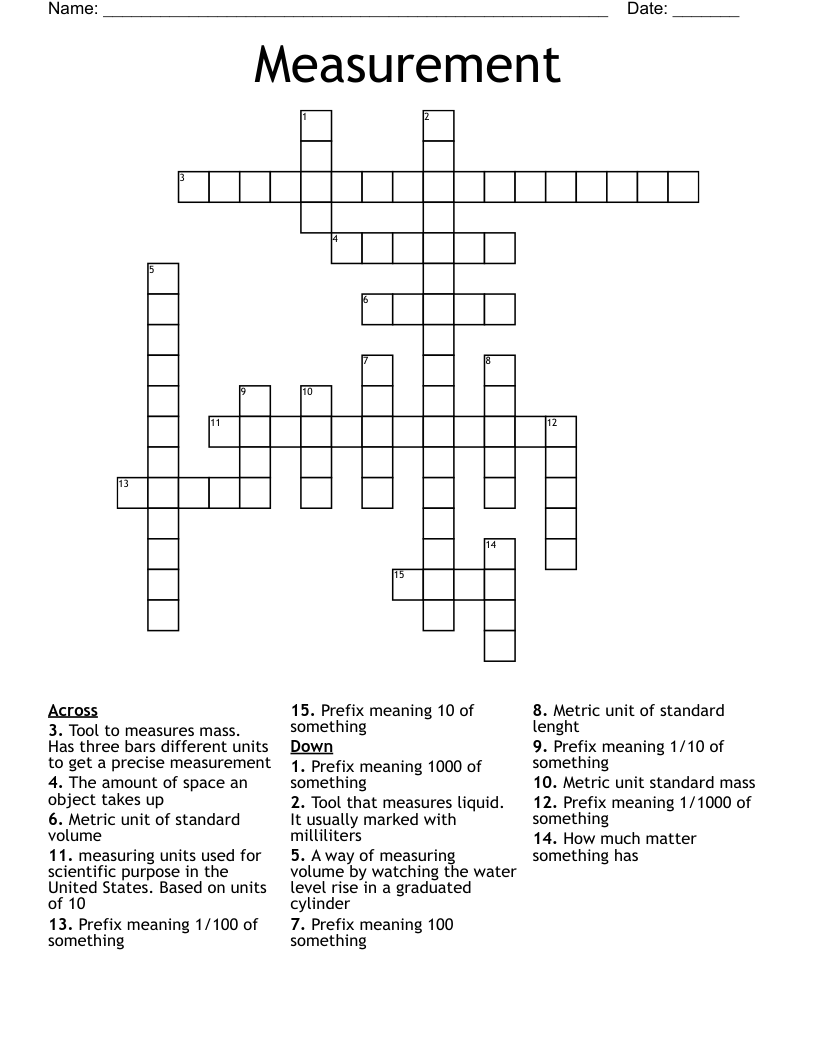Printing measurement crossword is a fascinating area that combines the art of printing with the intricacies of measurement techniques. In today’s fast-paced digital world, understanding how printing measurements work can significantly enhance the quality of printed materials, whether for personal projects or professional endeavors. This article aims to unravel the complexities of printing measurements, providing you with reliable insights and essential tools to excel in this domain.
The world of printing and measurement is multifaceted. From ensuring that your designs fit perfectly on the printed page to understanding various measurement units, it’s crucial to grasp these concepts thoroughly. This guide will explore the critical aspects of printing measurement crossword, breaking down the terminology, techniques, and tools you need to know.
By the end of this article, you will have a comprehensive understanding of printing measurement crossword, equipped with the knowledge to apply these principles effectively. Whether you're a seasoned professional or a beginner, this resource is designed to enhance your expertise and help you achieve outstanding printing results.
Table of Contents
- What is Printing Measurement?
- Importance of Printing Measurement
- Key Terms in Printing Measurement
- Types of Printing Measurements
- Tools for Printing Measurement
- Common Printing Measurement Techniques
- Challenges in Printing Measurement
- The Future of Printing Measurement
What is Printing Measurement?
Printing measurement refers to the methods and techniques used to quantify and assess various aspects of printed materials. This includes dimensions, color accuracy, and print quality. Understanding printing measurement is essential for graphic designers, printers, and anyone involved in the production of printed materials.
Key Components of Printing Measurement
- Dimensions: These include width, height, and depth of the printed item.
- Color Accuracy: Measurement of how closely the printed colors match the intended design.
- Print Quality: Assessment of factors such as clarity, sharpness, and evenness of the print.
Importance of Printing Measurement
Understanding printing measurement is crucial for several reasons:
- Quality Control: Accurate measurements ensure that the final product meets the desired quality standards.
- Cost Efficiency: Proper measurement can reduce waste and save costs during the printing process.
- Client Satisfaction: Delivering exactly what clients expect enhances trust and future business opportunities.
Key Terms in Printing Measurement
Familiarity with specific terminology is essential when discussing printing measurement. Here are some key terms:
- **PPI (Pixels Per Inch):** A measure of the resolution of an image.
- **DPI (Dots Per Inch):** A measure of the printing resolution, indicating how many dots of ink are applied within an inch.
- **Bleed:** The area of a printed piece that extends beyond the edge of the page, ensuring that there are no white borders.
- **Trim Size:** The final size of the printed piece after trimming.
Types of Printing Measurements
There are several types of measurements used in printing:
1. Dimensional Measurements
This includes measurements of length, width, and height of the printed object.
2. Color Measurements
Color measurements assess how accurately colors are reproduced in print. This is often done using spectrophotometers.
3. Print Quality Measurements
These measurements evaluate the overall quality of the print, considering factors like clarity, sharpness, and evenness.
Tools for Printing Measurement
Several tools are essential for accurate printing measurement:
- Measuring Tape: For basic dimensional measurements.
- Ruler: A precise tool for measurements in smaller formats.
- Caliper: Used for more accurate measurement of thickness and other dimensions.
- Spectrophotometer: For measuring color accuracy and consistency.
Common Printing Measurement Techniques
Several techniques are commonly used in printing measurement, including:
1. Manual Measurement
This involves using tools like rulers and measuring tapes to assess dimensions manually.
2. Digital Measurement
Utilizing software and devices to measure print quality and colors digitally for enhanced accuracy.
Challenges in Printing Measurement
While measuring printing can be straightforward, several challenges can emerge:
- Inconsistent Print Quality: Variations in printing conditions can affect the final output.
- Color Calibration Issues: Ensuring that colors are accurately reproduced can be challenging.
- Measurement Errors: Human error in manual measurements can lead to inaccuracies.
The Future of Printing Measurement
The future of printing measurement is promising, with ongoing advancements in technology. Innovations such as AI and machine learning are set to revolutionize how measurements are taken and analyzed, leading to even higher quality outputs.
Conclusion
In conclusion, understanding printing measurement crossword is vital for achieving high-quality printed materials. By familiarizing yourself with the key concepts, tools, and techniques discussed in this article, you can enhance your printing projects significantly. We encourage you to leave your comments below, share this article with your peers, and explore more resources on our website for deeper insights into the world of printing.
Final Thoughts
Thank you for taking the time to read our comprehensive guide on printing measurement crossword. We hope you found it informative and helpful. Be sure to visit our site again for more articles and insights into the fascinating world of printing and design!



